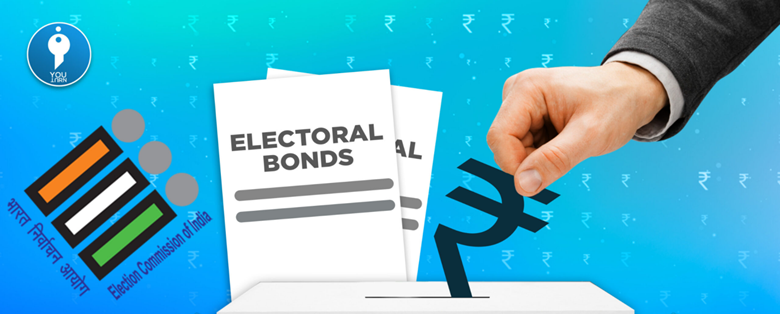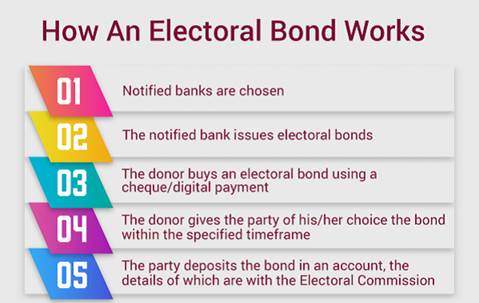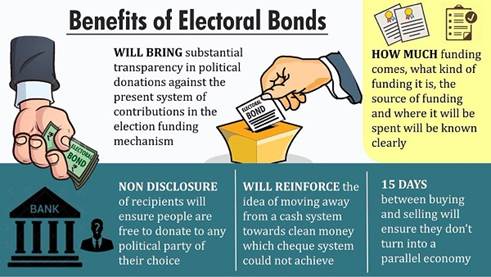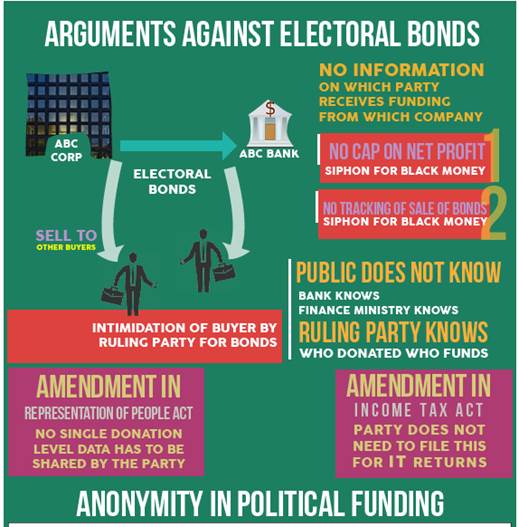Description

Copyright infringement not intended
In News
- According to data provided by the State Bank of India (SBI), in the last week of November 2022, nearly 954 Electoral Bonds (EBs), of which 666 were of the denomination of ₹1 crore, were sold.
- Mumbai sold the maximum among these followed by Delhi, both cities accounting for the sale of 628 of the total 954 Electoral Bonds sold.
- Electoral Bonds of over 676 crores had been sold during the period with Mumbai accounting for sales of over ₹ 309 crores and Delhi for ₹225 crores.
- During the period, 5% of Electoral Bonds sold are of the value of ₹1 crore each.
Electrol Bonds
- The Electoral bonds were introduced with the Finance Bill (2017).
- The Union Government notified the detailed guidelines about the Electoral Bonds Scheme in January 2018, intending to cleanse the system of political funding in the country.
- The Electoral Bond is a bearer instrument like a Promissory Note and an interest-free banking instrument.
- A bearer instrument is a document that authorizes the holder with the right of ownership or title of the property, such as Currency, shares or bonds.
- Unlike normally registered instruments, no record is kept about the owners of bearer instruments or the transfer of ownership.
- Whoever physically holds the bearer document is assumed to be the owner of the property.
- Electoral bonds may be purchased by a person, who is a citizen of India or established in India.
- An individual can buy electoral bonds either singly or jointly with other individuals.
- The Electoral Bond does not carry the name of the payee.
- Electoral bonds would be issued/purchased for any value, in multiples of Rs 1,000 from the specified branches of the State Bank of India (SBI).
- Electoral Bonds have a validity of 15 days.
- Political parties registered under Section 29A of the Representation of the People Act, 1951 and also secured a minimum of 1% of voters polled in the last general election to the House of the People or the Legislative Assembly of the State are eligible to receive electoral bonds.
- The Electoral Bonds shall be available for purchase for 10 days each in January, April, July and October, as may be specified by the Central Government.
- An additional period of 30 days shall be specified by the Central Government in the year of the General election to the House of People.
- Electoral Bonds can be encashed by an eligible political party only through their bank accounts with the authorised bank.
- The bonds do not have the name of the donor or the receiving political party.
- It only carries a unique hidden alphanumeric serial number as an in-built security feature.
- Electoral bonds protect the identity of political donors and parties receiving contributions.
- Donors who contribute less than Rs 20,000 to political parties through the purchase of electoral bonds need not provide their identity details such as PAN, etc.

Finance Bill (2017)
- Before the bill came into force;
- A company donating to a political party could contribute a maximum of 7.5% of the average net profits in the last three financial years.
- It was required to disclose the details of the contributions made to any political parties along with the name of the political parties to which such contributions were made.
- The Finance Bill (2017) introduced new provisions;
- It removed the maximum limit set on the companies for donations to political parties, now there is no limit on companies for donating to political parties.
- It also removed the requirement for a company to disclose the name of the political parties to which it was donating.
- The bill adds that "contributions will have to be made only through a cheque, bank draft, electronic means, or any other scheme notified by the government to make contributions to political parties."
Arguments in favour of the Electoral Bond
- It promotes transparency in funding and donation received by political parties.
- It is an important “electoral reform” toward a “cashless-digital economy”.
- It is a tool to eradicate black money in political funding.

Copyright infringement not intended
Arguments against Electrol Bond
- The bonds increase the anonymity of political donations, Citizens will not be able to know who is donating how much money to which political party.
- Promoting corruption and lack of transparency in the accounts of all political parties.
- The electoral bonds scheme has opened floodgates to unlimited corporate donations to political parties and anonymous financing by Indian as well as foreign companies which are a threat to Indian democracy.

Copyright infringement not intended
Concern
- The Election Commission and the Reserve Bank of India objected to electoral bonds and had advised against the issuance of electoral bonds as a mode for donation to political parties.
- It alleged that almost 99% of electoral bonds purchased are of value one crore and 10 lakh denominations which shows that it is not individual citizens but large corporations which are purchasing these bonds intending to receive kickbacks from the government.
- The Election Commission of India filed an affidavit in 2019, saying the government’s scheme for political funding has legalized anonymity.
- Many major political parties have not disclosed the amount they received through electoral bonds.
- As the bonds are sold through a public sector bank, the government would easily know who is funding which political party.
.jpg)
Way Forward
- It is important to fill the gaps in the present laws to make the entire electoral process more accountable and transparent.
- There is a need for effective regulation of political funding along with courageous reforms to break the vicious cycle of corruption and improve the quality of democratic polity in India.
.jpg)
https://www.thehindu.com/news/national/electoral-bonds-worth-over-676-crores-sold-during-a-single-week-in-november-rti/article66239802.ece
https://t.me/+hJqMV1O0se03Njk9









.jpg)








